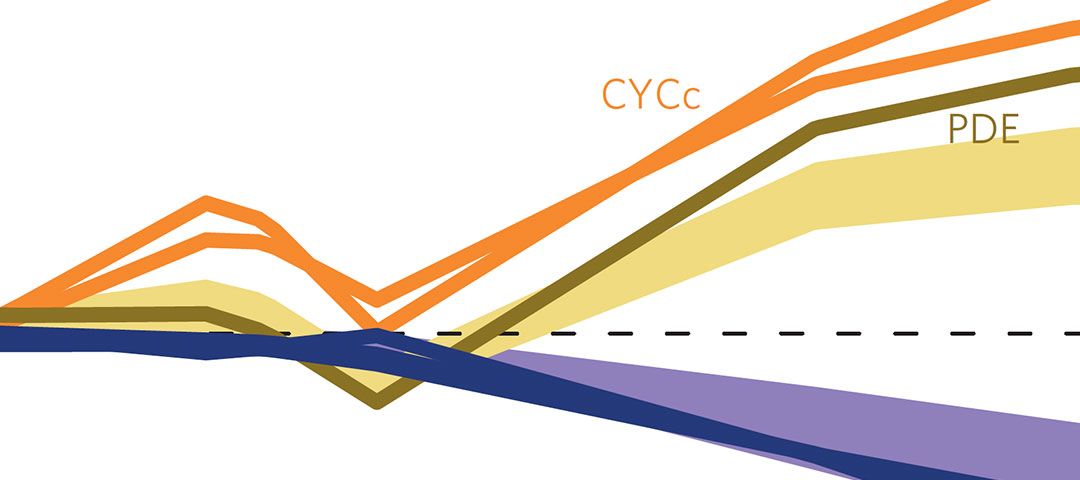Genetic Switch May Help Marine Microalgae Respond to Higher CO2 Levels
 isbscience.org/news/2015/06/15/genetic-switch-may-help-marine-microalgae-respond-to-higher-co2-levels/
isbscience.org/news/2015/06/15/genetic-switch-may-help-marine-microalgae-respond-to-higher-co2-levels/
3 Bullets
- Rapid climate change, including ocean acidification caused by increasing carbon dioxide (CO2) levels, is predicted to affect the oceans, sea life, and the global carbon cycle.
- Marine microalgae, including diatoms, are responsible for converting CO2 into oxygen and biologically usable carbon through photosynthesis. How these organisms will respond over the short and long term to rising CO2 is unknown.
- Growth experiments and transcriptomic analyses performed by UW and ISB researchers showed that the model diatom Thalassiosira pseudonana respond to increasing CO2 by down-regulating gene clusters involved in carbon concentrating mechanisms (CCMs) and photorespiration. It is hypothesized that this acclimation may allow diatoms to conserve energy at moderately increased CO2 levels, with implications for shifts in the composition and productivity of marine microbial ecosystems.
By Dr. Justin Ashworth
Studying and anticipating the effects of modern climate change on the planet’s ecosystems is important for us to understand what changes will occur in the environment during this century and beyond. A rapid increase in atmospheric carbon dioxide (CO2) levels beginning in the 19th century is causing an increase in the amount of CO2 entering the oceans and a drop in ocean pH (ocean acidification). The world’s oceans are teeming with photosynthetic marine microalgae that convert dissolved forms of carbon dioxide into oxygen and bio-available carbon. These microalgae include diatoms, which dominate in nutrient-rich coastal areas and higher latitudes. While evidence exists that calcifying organisms (e.g. corals) may be particularly challenged by future ocean conditions, it is not known how marine microalgae will respond to rapidly rising CO2 levels.
Title: Diatom acclimation to elevated CO2 via cAMP signalling and coordinated gene expression
Journal: Nature Climate Change
Authors: Gwenn M. M. Hennon, Justin Ashworth, Ryan D. Groussman, Chris Berthiaume, Rhonda L. Morales, Nitin S. Baliga, Mónica V. Orellana & E.V. Armbrust
Link: Article preview
As part of a collaboration between the Institute for Systems Biology and the University of Washington, researchers performed experiments and analyses of gene expression that show that the model diatom cell Thalassiosira pseudonana responds to increasing CO2 by down-regulating groups of genes involved in carbon concentrating mechanisms (CCMs) and photorespiration. It is hypothesized that this acclimation may allow diatoms to save energy at moderately increased CO2 levels, with implications for shifts in the composition and productivity of marine microbial ecosystems. The latest findings of this research can be found in the scientific journal Nature Climate Change.
The application of systems biology and data-driven analyses to the study of environmentally important biology is a key component of the ISB’s strategic plan. In addition to the work described above, ISB projects led by Drs. Mónica V. Orellana and Nitin S. Baliga include the reverse engineering of diatom physiology, investigations of programmed cell death. Ongoing work includes the study of multi-conditional impacts of climate change on algal growth and physiology at high resolution, integrative analyses of large data sets to discover and infer the coordination of cellular biology in new species, and methods to measure, model and predict the ecophysiology and composition of dynamic ocean microbial communities both now and in the future.
ISB researchers and educators are also engaged in outreach in order to disseminate the background, theory, importance and findings of this research to the greater community. This include the development and implementation of multiple educational modules for the incorporation into the science curriculum of high schools nationwide.
About Justin Ashworth: Justin is a postdoc in the Baliga Lab at ISB.
This research was sponsored by the National Science Foundation (OCE 0928561, MCB 1316206)





